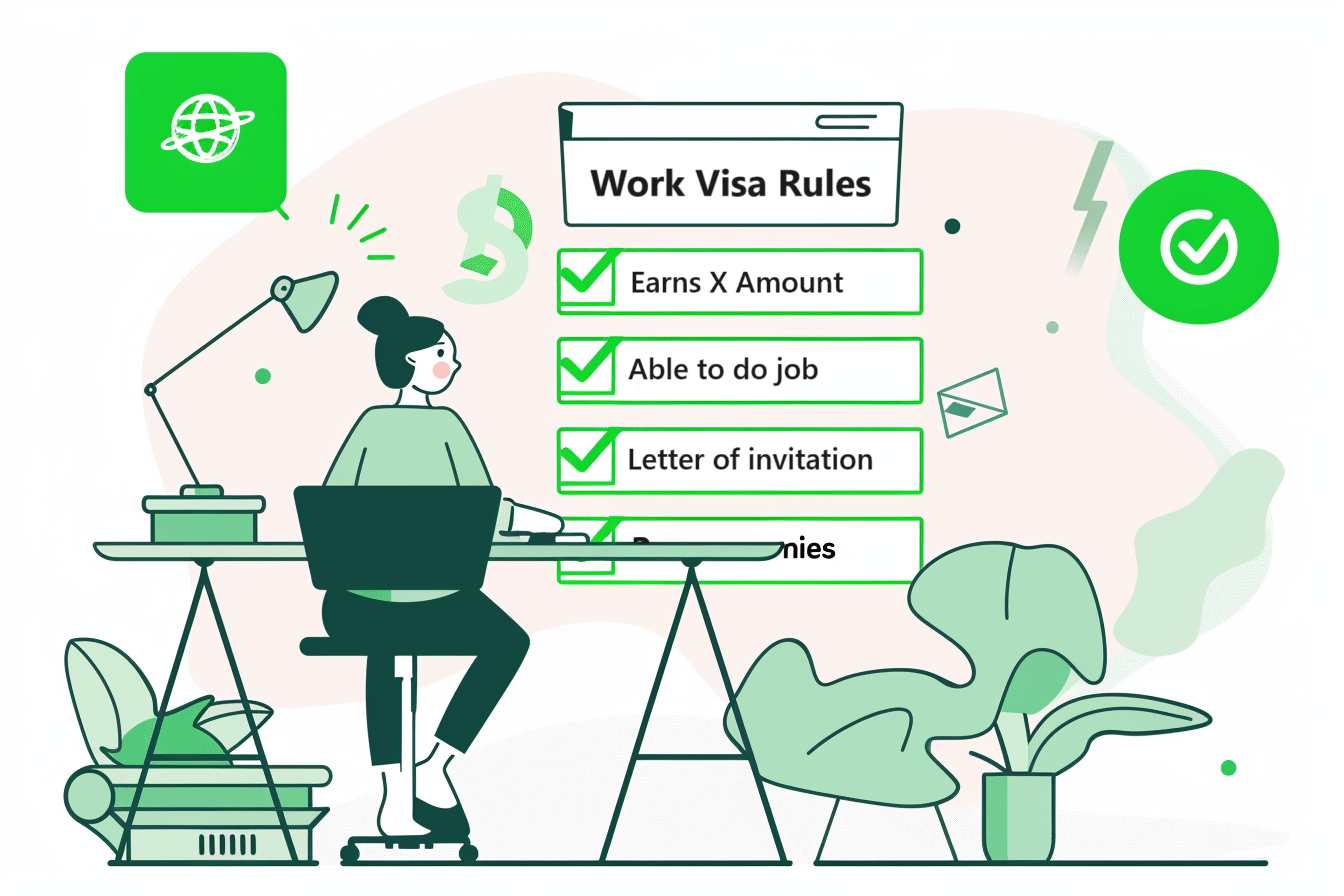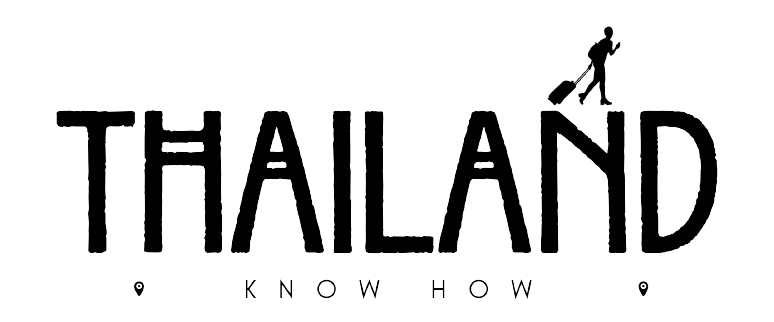Explore the rules for securing a Thailand work visa as a remote worker. Get insights on requirements, fees, and application processes.
Amidst the sandy beaches and vibrant cityscapes, a striking 74% of Thailand’s workforce has expressed interest in remote work, reflecting a global trend towards more flexible working environments. For digital nomads and remote workers, this statistic suggests Thailand as an enticing destination. However, staying on the right side of the law requires a thorough understanding of the Thailand Work Visa Rules for Remote Workers. This means decoding the eligibility criteria for a work visa for remote workers in Thailand and unraveling the process for obtaining a work visa as a remote worker in Thailand which might be more complex than one assumes.
Digital nomads flock to Thailand for its culture, affordability, and hospitable environment, but the legalities of working remotely in such a paradise require serious consideration. Just engaging in an online business, managing a blog, or providing any form of digital service could necessitate proper documentation as per local laws. Understanding how to navigate these regulations is essential for anyone looking to blend the joys of living in Thailand with the fulfillment of a remote career.
Key Takeaways
- Grasping the Thailand Work Visa Rules for Remote Workers is essential for digital nomads to legally work and reside in the country.
- Activities considered “work” in Thailand may be broader than in other countries, highlighting the importance of determining the eligibility criteria for a work visa.
- Remote workers need to be well-versed in the eligibility criteria for work visa for remote workers in Thailand to avoid legal complications.
- Comprehending the process for obtaining a work visa as a remote worker in Thailand can significantly smooth the transition to living and working in this sought-after destination.
- It is important to regularly stay updated on visa regulations as they can change and directly impact the legality of remote working in Thailand.
Understanding Thailand’s Work Visa Requirements for Foreigners
The allure of Thailand as a hub for digital nomadism is undeniable, but understanding the country’s legal landscape is crucial for those wishing to engage in remote work within its borders. Navigating Thailand’s work visa requirements is a prerequisite for lawful employment and an imperative step towards a seamless integration into Thai professional life. Let’s delve into the nuances of Thailand’s work visa regulations and guidelines.
Criteria for Recognizing Work by the Thai Work Permit Office
The Thai Work Permit Office identifies ‘work’ based on the creation of output through the application of energy, knowledge, or effort. This broad definition signifies that foreigners, including remote workers, may require official documentation such as work permits, even if their professional endeavors don’t involve local renumeration. With the emergence of remote work in Thailand visa regulations have become a topic of heightened importance for digital nomads and remote professionals alike.
Typical Cases of Work Activities Assessed by Thai Authorities
Work visa guidelines for remote workers in Thailand encompass a variety of commonplace tasks that are often part and parcel of the digital nomad lifestyle. Even seemingly innocuous activities like contributing to blogs, engaging in freelance projects for Thai companies, or conducting business while residing in the country can fall under activities needing regulation. Accordingly, it’s vital for expatriates to comprehend the extensive gamut of tasks that the Thai government considers as work.
Importance of Work Permits for Business and Freelance Activities
A work permit is not just a formality; it’s a critical component of legally conducting business or freelance activities on Thai soil. It functions as a safeguard for local employment and upholds the integrity of the Thai economy, enabling foreigners to contribute to the marketplace without disrupting local labor dynamics.
| Activity | Work Permit Required? | Notes |
|---|---|---|
| Online Teaching from Co-working Spaces | Yes | Under Thai law, education services are a form of work. |
| Freelance Website Design for Local Businesses | Yes | Direct contribution to the Thai economy requires a permit. |
| Business Blogging | Yes | Content creation impacting Thai image or business interests are included. |
| Passive Involvement in Family Business | No* | Provided no direct competition with Thai labor is observed. |
| Rental Property Management | No* | Restricted to minor volume without significant local interaction. |
*These determinations can vary based on the degree of involvement and subject to change per Thai visa regulations.
In the shimmering tapestry of Thailand’s economic panorama, the line between professional pursuits and leisurely activities is nuanced, necessitating foreign participants to vigorously seek out the right visa and work permit information to remain compliant and take full advantage of the mesmerizing backdrop Thailand offers for remote work.
Eligibility and Documentation for Thailand Work Visa
The allure of Thailand as a choice locale for remote workers is well-recognized, given its picturesque landscapes and cost-effective living standards. However, in order to legally enjoy the benefits of operating remotely in this vibrant country, one must navigate the requirements for remote workers in Thailand. A work visa not only legitimizes your status but also ensures peace of mind as you contribute economically to Thai society.
In terms of eligibility, procuring a Thai Work Visa often necessitates demonstrating a combination of requisite income levels, professional experience, and qualifications from employers. The Thai government has instituted the Smart Visa program, catering to a spectrum of professionals including talented individuals, investors, executives, and entrepreneurs striving to capitalize on Thailand’s burgeoning markets.
Below is an overview of the documentation needed for work visa application for remote workers in Thailand, which is quintessential for your legal sojourn in the country. It’s important to note that requirements can vary depending on the specific type of visa applied for—such as the Smart T, Smart I, Smart E, Smart S, or Smart O Visas—each tailored to different professional roles and contributions to certain industries.
| Visa Category | Required Documentation | Professional Eligibility |
|---|---|---|
| Smart T (Talents) | Professional Certifications, Resume, Employer Testimonials | Highly-skilled experts in technology, health, or research |
| Smart I (Investors) | Proof of Investment, Business Plans, Financial Statements | Minimum investment in the targeted industries |
| Smart E (Executives) | Company Registration, Business License, Executive Credentials | Senior management in high-technology sectors |
| Smart S (Startups) | Incorporation Documents, Endorsements from Thai Agencies, Proof of Funding | Startup founders targeting innovation and technology |
| Smart O (Others) | Marriage Certificate (if applicable), Police Clearance, Financial Evidence | Spouses and dependents of Smart Visa holders |
Endorsements from professional bodies and financial proof remain quintessential across all categories for the Smart Visa application. The duration of stay varies, but on the Smart Visa, one can relish up to a four-year sojourn without the usual rigmaroles of annual renewals. This fosters a stable environment conducive for productivity and cultural immersion.
Amidst your preparations, it’s significant to stay abreast with any updates on visa policies to preempt any inconveniences. As daunting as the paperwork might seem, the payoff is the freedom to prosper as a remote worker amidst Thailand’s impeccable charm.

Thailand Work Visa Rules for Remote Workers
As the allure of Thailand continues to draw remote workers from around the globe, it’s essential for digital nomads to grasp the intricacies of the local work visa regulations. Navigating the Thai legal landscape requires an understanding of how different remote work activities are categorized and the potential implications of operating without appropriate documentation.
How Thailand Classifies Remote Work for Visa Purposes
In Thailand, the classification of remote work for visa purposes is rooted in whether an action contributes effort, knowledge, or energy towards producing outcomes. This broad interpretation captures a range of activities often engaged in by digital nomads, from content creation to tech development. Due to the evolving nature of work visa guidelines, it is crucial for applicants seeking a work visa application for digital nomads in Thailand to stay informed and compliant.
Remote Work Activities that Require a Work Visa in Thailand
The definition of work in Thailand encompasses more than just the usual employment activities. Especially relevant to digital nomads is the provision of services that impacts the local market or the economy. Here are some key activities that mandate a remote work permit in Thailand:
- Offering professional services directly to Thai companies or individuals
- Sourcing local goods for international markets
- Developing apps, websites, or other digital content for Thai audiences
- Conducting educational workshops or seminars
| Activity Type | Work Visa Requirement |
|---|---|
| Professional Consultation | Required |
| E-Commerce with Local Products | Required |
| Content Creation Affecting Thai Image/Security | Required |
| Passive Online Income (e.g., blogging, vlogging) | Case-by-Case Basis |
Implications of Working Remotely in Thailand without Proper Documentation
Engaging in remote work in Thailand without a legitimate work permit can pose significant legal concerns. While the current approach of Thai authorities might indicate leniency, this should not be misconstrued as acceptance of undocumented work. Consequences of such an oversight could range from fines to deportation, making it critical for digital nomads to secure the necessary remote work permit in Thailand. The possibility of future regulatory reforms further underscores the importance of adhering to current visa requirements.
Process for Obtaining a Thai Work Visa as a Digital Nomad
Embarking on the digital nomad lifestyle in Thailand requires adherence to the legal process for obtaining a work visa. This journey involves a series of critical steps to ensure you can legally work remotely while experiencing the rich culture and beautiful landscapes of Thailand. The Smart Visa in particular, tailored for highly skilled individuals and investors, is one of the key options available to digital nomads.
The initial step in the process is an online application, where remote workers must furnish details about their Work qualifications and the nature of their remote jobs. It’s essential to compile all the necessary documentation, highlighting qualifications and evidence of the remote working arrangement.

- Submit an online application with detailed personal and professional information.
- Obtain a qualification endorsement which verifies your eligibility for a Thai work visa.
- Schedule and attend a visa issuance appointment, presenting all required documents.
- For Smart Visa applicants, undergo a review by Thailand’s Board of Investment.
- On qualification, apply for a visa through a Thai embassy or consulate.
- Pay associated visa fees upon approval of the application.
- To renew the visa, initiate the renewal process at least 60 days prior to expiration.
- Maintain continuous qualification endorsements for extending the Smart Visa.
The subsequent table outlines the essential documents required to pursue the work visa application process for remote workers looking to live and work in Thailand legally:
| Document | Description | Purpose |
|---|---|---|
| Online Application Form | Complete digital form with personal and professional information. | Serves as the preliminary step in the visa application process. |
| Qualification Endorsement | Official document that endorses the applicant’s professional qualifications. | Used to verify eligibility for obtaining the Thai work visa. |
| Passport & Photographs | Valid passport and recent passport-sized photographs. | Required for identity verification and visa documentation. |
| Proof of Employment | Documents that confirm ongoing employment with a remote company. | Establishes the legitimacy of remote work activities in Thailand. |
| Financial Evidence | Bank statements or income proof to show financial stability. | Demonstrates the ability to support oneself while residing in Thailand. |
| Smart Visa Criteria Documentation | Specially required documents for Smart Visa applicants, as per the Board of Investment’s directives. | Qualifies the applicant for the specialized Smart Visa program tailored to professionals. |
By following these steps and preparing the required documentation, digital nomads can navigate the process for obtaining a work visa as a remote worker in Thailand with clarity and confidence.
Thailand’s Digital Nomad and Smart Visa Programs
As Thailand continues to position itself as a hub for global talent, the Smart Visa program stands out as a forward-thinking initiative aiming to attract a diverse group of skilled workers, investors, and entrepreneurs. The allure of residing in a culturally rich and technologically progressive country like Thailand has become even more attractive with the introduction of visas tailored to the needs of remote workers and professionals from around the world.
The Introduction of Smart Visas for Skilled Workers and Investors
Smart Visas represent Thailand’s commitment to fostering innovation and expertise within its borders. Launched to enhance the country’s competitive edge in key industries, these visas provide a plethora of advantages for qualified individuals seeking to contribute their skills or invest in Thailand’s economy. The criteria for these visas are clear-cut and structured to benefit both the applicants and the Thai industries they will be supporting.
Assessing the Eligibility for a Smart Visa in Thailand
When it comes to determining eligibility criteria for work visa for remote workers in Thailand, the Smart Visa program stands out for its precise standards. Applicants are evaluated on professional experience, income levels, and their potential impact on Thailand’s targeted industries. Successfully meeting these criteria not only opens the door to working in Thailand but also ensures a seamless integration into the country’s economic framework.
Features and Benefits of Thailand’s Long-Term Resident (LTR) Visa
The Long-Term Resident visa is specifically engineered for remote workers who are employed by international companies. With its lengthy validity and the possibility for extensions, it offers unparalleled stability for remote professionals in Thailand. The inclusion of financial criteria serves to ensure the readiness and commitment of both the remote workers and their employers, fostering a professionally beneficial environment for all involved.

| Visa Type | Validity Period | Target Applicants | Key Benefits |
|---|---|---|---|
| Smart Visa | Up to 4 years | Skilled professionals, investors, executives, and startups | Long stay, no work permit needed, includes dependents |
| Long-Term Resident (LTR) Visa | Up to 10 years, extendable | Remote workers employed by international companies | Long validity, straightforward extension, encompasses dependents |
Grasping the eligibility criteria for work visa for remote workers in Thailand is crucial for those aspiring to take advantage of these programs. For more details on how you can fit into this evolving framework and turn the Land of Smiles into your workspace, continuing research and consultation with immigration experts are recommended.
Living and Working in Thailand: Lifestyle, Costs, and Facilities
Thailand has become an enticing haven for expats and remote workers from across the globe, driven by its vibrant culture, affordable living, and generous work visa rules. Beyond the benefit of adhering to Thailand Work Visa Rules for Remote Workers, the country offers a unique blend of tropical beauty, bustling city life, and serene countryside—all providing an enriching living and working environment for those who choose to make it their home.
Why Thailand Appeals to Expats and Remote Workers
The lure of Thailand extends beyond its picturesque landscapes and extends to a sense of community and safety that is second to none. Expats find a wealth of resources and networks to tap into, ensuring a smooth transition into their new lifestyle. Living and working in Thailand not only fuses leisure with productivity but also surrounds individuals with a supportive network of fellow global citizens, all while enjoying a lifestyle that may have seemed unattainable in their home countries.
Cost of Living Considerations for Digital Nomads in Thailand
One of the primary considerations for digital nomads is the cost of living, which, in Thailand, is notably reasonable. From street food that tantalizes the taste buds without emptying the wallet to accommodation options ranging from modest apartments to luxurious villas, Thailand allows for a comfortable living standard on a remote worker’s budget. Entrepreneurs often find that the savings on living expenses can be strategically reinvested into their businesses or savings.
Thailand’s Digital Infrastructure and Support for Remote Workers
For digital nomads, reliable internet and coworking spaces are the lifeblood of their existence, an area in which Thailand excels. Major urban centers like Bangkok and Chiang Mai are equipped with state-of-the-art digital infrastructure. An abundance of coworking spaces, as well as a thriving café culture with Wi-Fi, ensures that remote workers never lack for a productive workspace. This robust support framework empowers those abiding by Thailand Work Visa Rules for Remote Workers to maintain an effective and efficient business operation from anywhere in the country.
Conclusion
As the landscape of global work habits undergoes a dramatic transformation, Thailand emerges as a unique destination for the digital nomad community. With this in mind, understanding Thailand Work Visa Rules for Remote Workers is not just beneficial—it is essential for maintaining one’s ability to operate within the law. The future of remote work in Thailand offers promising opportunities, provided individuals maintain keen awareness and compliance with current visa regulations.
Future of Remote Work in Thailand and Legal Compliance
The trend towards remote working is picking up speed, and with this shift, Thailand’s legal framework is adapting. Remote workers must exercise diligence in adhering to the evolving policies, particularly as the Thai government evaluates the impact of a global workforce on its shores. It’s an ongoing journey of adaptation and compliance for those looking to harness the potential of remote work in this vibrant nation.
Navigating the Changing Landscape of Work Visa Regulations in Thailand
The changing tides of work visa regulations present both challenges and opportunities for remote workers. By staying informed about the Thailand Work Visa Rules for Remote Workers, digital nomads can position themselves to seize the future of work on this side of the globe. Legal compliance does not simply safeguard against potential issues—it also paves the way for a smooth and enriching experience in the culturally rich tapestry of Thailand.
Navigating the Changing Landscape of Work Visa Regulations in Thailand
What are the eligibility criteria for a work visa for remote workers in Thailand?
Eligibility for a work visa in Thailand typically includes proof of income, relevant experience, employer qualifications for specialized visas like the Smart Visa, and adherence to legal requirements set by Thai immigration laws. Documentation for qualification, financial stability, and employer endorsements may be required.
What is the process for obtaining a work visa as a remote worker in Thailand?
The process involves submitting an online application, receiving a qualification endorsement if necessary, attending a visa appointment, and providing all necessary documentation. For Smart Visas, apply through the Thai Board of Investment, and then file for the visa at a Thai embassy or consulate upon approval.
How does the Thai Work Permit Office recognize work?
The Thai Work Permit Office classifies work as any activity that involves the exertion of energy, knowledge, or effort to produce something, regardless of payment. This broad definition often includes activities by remote workers and digital nomads.
What typical cases of work activities are assessed by Thai authorities?
Typical cases include digital nomads working at coworking spaces, online teaching, freelance designing for local businesses, blogging, managing online shops, and conducting business meetings within Thailand.
Why are work permits important for business and freelance activities in Thailand?
Work permits are crucial to ensure that foreign workers comply with Thai laws. They legitimize business activities and protect against potential legal issues or penalties for working without proper authorization.
What specific documentation is needed for a work visa application for remote workers in Thailand?
Required documents typically include passport, proof of employment or business activities, educational and professional qualifications, financial evidence, a health certificate, and a police clearance, among others, depending on the visa type being applied for.
How does Thailand classify remote work for visa purposes?
Remote work is classified as any work-like activity that remote workers engage in, which involves providing services or producing work that could potentially affect Thai economic interests or image.
What remote work activities require a work visa in Thailand?
Work activities that require a visa include services to local entities, active management of business or commerce, offering freelance services competitively within the country, and other activities deemed as work under Thai law.
What are the implications of working remotely in Thailand without proper documentation?
Working without proper documentation exposes remote workers to risks of legal sanctions, including fines, visa revocation, and deportation. Undocumented work may also lead to issues if laws become stricter or if there are reports of disturbances.
Can you describe the application process for digital nomads seeking a Thai work visa?
Digital nomads must usually undergo a process similar to other remote workers which includes application submission, obtaining the necessary endorsements, attending an appointment at a Thai embassy or consulate with all supporting documentation, and paying the visa fees upon approval of the application.
What is the Smart Visa program?
The Smart Visa program is designed to attract highly skilled professionals, investors, and startup entrepreneurs to Thailand, offering benefits like a 4-year stay, various categories according to the professional role, and permission for dependents to accompany the primary visa holder.
How is eligibility for a Smart Visa assessed in Thailand?
Eligibility is gauged based on criteria like income level, experience, business plan for entrepreneurs, and the potential contribution to designated industries as set by the Thai Board of Investment (BOI).
What are the features and benefits of Thailand’s Long-Term Resident (LTR) Visa?
The LTR Visa offers a long validity of up to 10 years, the possibility of extension, and is targeted at professionals employed by international companies outside of Thailand that meet certain financial thresholds. This visa also allows for dependents and provides various resident benefits.
Why do expats and remote workers find Thailand appealing?
Expats and remote workers are drawn to Thailand for its safety, supportive expat community, high-quality yet affordable lifestyle, diverse visa options, and scenic beauty that balances work and leisure.
What is the cost of living for digital nomads in Thailand?
Thailand offers an affordable cost of living, with sensible expenses for housing, food, and transportation. This allows digital nomads and entrepreneurs to allocate more resources towards business investments and savings.
How does Thailand’s digital infrastructure support remote workers?
Thailand’s major cities, such as Bangkok and Chiang Mai, provide robust digital infrastructures with high internet speeds, co-working spaces, and supportive communities that facilitate remote work and digital nomadism.
How will the future of remote work in Thailand affect legal compliance?
As remote work gains popularity, it’s anticipated that Thailand may adapt its legal framework to better accommodate digital nomads. Staying informed on visa regulations and maintaining legal compliance will be important to securely and legally work remotely in Thailand.
What should remote workers know about navigating work visa regulations in Thailand?
Remote workers should keep abreast of updates in the legislation related to work visas, understand the types of visas available, ensure all activities are backed by the appropriate documentation, and follow Thai laws to navigate potential legal issues while working in the country.






Leave a reply